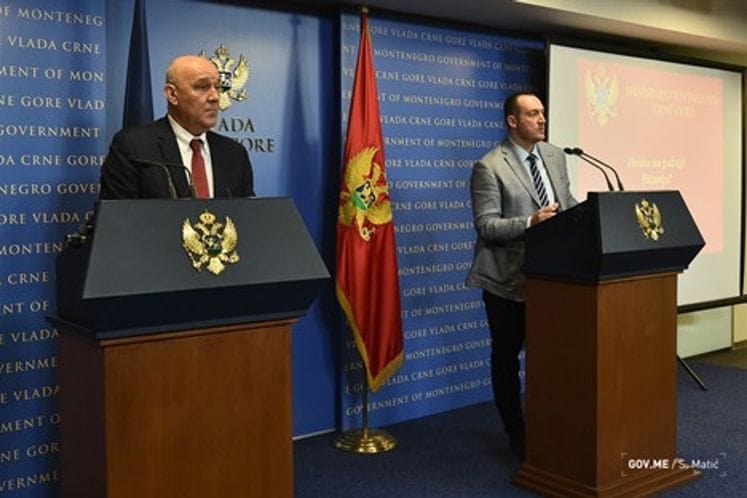- Government of Montenegro
2020 Budget Law presented: More money for citizens...
Please note: The page below represents the archived content relating to the previous Government of Montenegro. Some of the information might be inaccurate or outdated.
Archive
2020 Budget Law presented: More money for citizens and development projects

Published on: Nov 15, 2019 • 10:42 PM Author: PR Service
Minister of Finance Darko Radunović and Director General of the Directorate for Budget at the Ministry of Finance Bojan Paunović presented today at a press conference the 2020 Draft Law on the Budget.
"The aim of the economic policy of the Government of Montenegro is to increase the standard of living of the citizens, i.e. to further approximate GDP per capita to the EU average. According to this parameter, Montenegro is currently at 47% of the EU average, which is at the highest level in the region," said Finance Minister Radunović presenting the Draft Law on the Budget passed by the Cabinet last night.
"With the aim of further approximating the standard of living of our citizens to the European average, the Government is implementing economic policy measures aimed at strengthening fiscal stability and increasing the competitiveness of the economy," Minister Radunović said, noting that the economic policy results achieved in the past period suggest that fiscal position of Montenegro was further strengthened, as evidenced by the following:
- record economic growth rates of 4.7% in 2017 and 5.1% in 2018 were achieved, with continued positive developments in 2019, which allowed for a 15% increase in employment compared to 2016 and wage growth reflected on the strong growth of budget revenues;
- the fiscal consolidation measures implemented have made it possible to reduce the budget deficit, to create stable sources of budget financing through the most successful Eurobond issue so far, aimed at refinancing part of the public debt;
- assumptions have been made to improve the standard of living of the lowest-income employees by increasing the minimum wage by 15%, reducing the overall tax burden on labour by reducing the rate of mandatory health insurance contributions at the expense of the employer by 2 percentage points and abolishing the so-called "crisis tax", that is returning the proportional income tax rate to the rate of 9% for all categories of earnings;
- tax debt has been reduced by over 30% compared to 2016;
- all this is possible with the regularity and preservation of the level of wages, pensions and social benefits and regular servicing of all public functions, as well as the implementation of capital projects aimed at infrastructure development through the largest investment in the Capital Budget in the history of Montenegro.
In addition, in the previous two years, more favourable borrowing enabled refinancing and repayment of previous debts on much better terms, which enabled the creation of a more favourable credit structure of public debt and the distribution of maturities. This has taken advantage of favourable circumstances in the international capital market, and reduced the need for additional borrowing in the future, and given that funds for debt financing have been provided for the coming year, the country's exposure to possible adverse economic developments in the international environment has been significantly reduced.
The Minister of Finance stressed that fiscal adjustment measures enabled to:
- increase budget revenues by over EUR 260 million from the beginning of the Government's term, i.e. about 15%, with the continuation of the tendency of further growth of revenues in the next year;
- reduce the budget deficit from 5.8% of GDP in 2017 to below 1% of GDP in 2020 with a current account surplus of over EUR 180 million and a primary budget surplus of 1.1% of GDP.
- continuously allocate Capital Budget funds for completion of existing and implementation of new infrastructure projects.
The Minister of Finance emphasised that further strengthening of the stability of public finances is also proposed through the projected Budget for 2020, enabling continued investment in the high-quality government services in all sectors.
The Minister pointed out that the budget proposal for the next year and in the medium term created the preconditions for the realisation of the Government's commitment regarding the valorisation of Montenegrin airports and sustainability in the operations of the national air carrier.
The capital budget was set at the level of EUR 229.96 million, while at the same time preconditions were created for credit funds in the amount of over EUR 150 million to be effective for the implementation of capital projects in the coming period.
VIDEO: https://youtu.be/z1dmdBBA1pI
Related articles:
Presidents of northern municipalities: The Emirates and Alabbar are welcome in Montenegro Mar 24, 2025
Statement by Deputy Prime Minister Aleksa Bećić Mar 24, 2025
Is this page useful?
